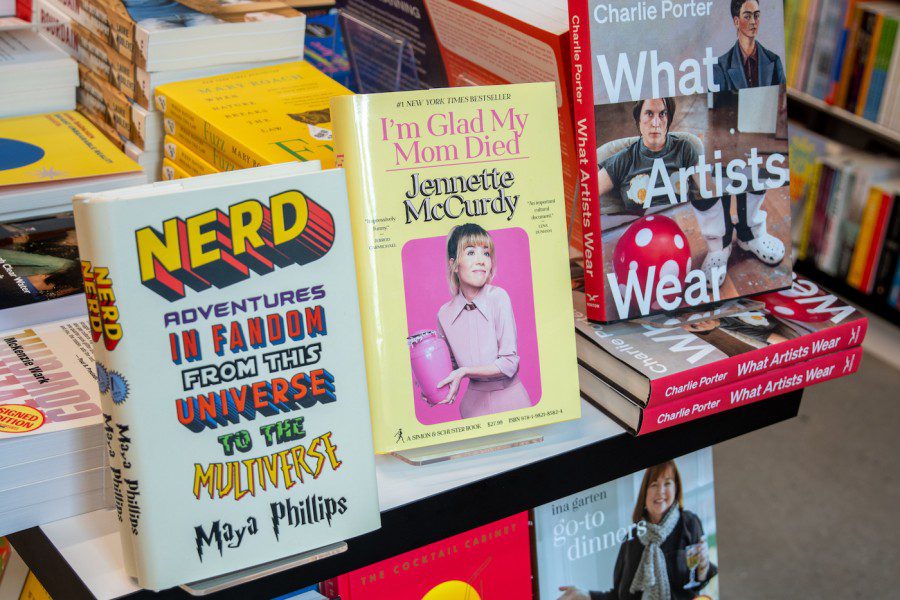Review: ‘I’m Glad My Mom Died’ offers a new take on memoirs
“iCarly” comedian Jennette McCurdy lays everything bare in her debut novel.
“I’m Glad My Mom Died,” by Jennette McCurdy, is a memoir detailing the author’s life as a child actress and her relationship with her abusive mother. It was published by Simon & Schuster on Aug. 9.
November 4, 2022
Content warning: This article discusses eating disorders and sexual, physical and emotional abuse.
Although broken interpersonal dynamics may be common when it comes to child stardom, the camera often fails to capture them. Former Nickelodeon star Jennette McCurdy’s new memoir, “I’m Glad My Mom Died,” lays bare the hostile and abusive relationship she had with her late mother, Debra, who died in 2013 after a second battle with cancer.
Raised in the small suburb of Garden Grove, California, McCurdy grew up in a poor Mormon family consisting of her parents, Debra and Mark, and three older brothers. Her mother, whose own parents discouraged her from becoming an actress, forced McCurdy into the acting profession at the age of six.
Despite not wanting to pursue acting, McCurdy felt obliged to keep her mother’s emotions at bay. Throughout the memoir, McCurdy writes about how Debra would show the greatest pride when she succeeded, yet also displayed emotional aggression whenever an audition didn’t come to fruition. To gain a sense of control, Debra began reaching out to Hollywood executives in hopes of convincing them to cast her daughter — much to McCurdy’s embarrassment.
Working her way through the acting circuit, McCurdy began her career as an extra in several television series. Gradually, she received leading roles, most notably on “Malcolm in the Middle.” It wasn’t until 2008 when she was cast in Nickelodeon’s hit show “iCarly” that McCurdy became a household name.
Despite portraying Sam Puckett, a character with an affinity for food, McCurdy’s real-life relationship with food was much different. Her mother closely watched her weight with a regimen that consisted of weekly weigh-ins, strict calorie counting, and a diet of shredded low-calorie lunch meats and pieces of lettuce barely sprayed with dressing. McCurdy blames her development of bulimia, anorexia and binge eating on her mother.
Besides the relationship she had with her mom, McCurdy talks at great length about the horrors of being a child star. When “Sam and Cat,” a spin-off of “iCarly” and “Victorious” that McCurdy co-starred in with future pop star Ariana Grande, was canceled in 2013, McCurdy claims that Nickelodeon offered her $300,000 in “hush money” to not speak about her experiences working for the network. McCurdy rejected the offer, according to the book.
She describes several events where an “iCarly” producer, referred to only as “The Creator,” mistreated the underaged actors that were on the show. In all of these anecdotes, one thing was common: “The Creator” established a hostile and toxic on-set environment. Despite the unwelcoming conditions she worked in, McCurdy also looks back on “iCarly” with some fondness, as she became close friends with her co-stars — notably with Miranda Cosgrove.
Of many heartbreaking anecdotes, the hardest one to read described Debra supervising McCurdy in the bathroom until she was 17. Jennette writes about how Debra gave her “breast and vaginal exams” that made her “body stiff with discomfort.” She writes, “I felt violated, yet I had no voice, no ability to express that.” All in all, by acknowledging her mom’s toxic tactics, McCurdy acknowledges that her “mother emotionally, physically and mentally abused me in ways that will forever impact me.”
What makes McCurdy’s book different from other memoirs is her balance between hard-cold truth and dark humor. She does not write about her memories as a pity fest, but instead acknowledges the emotions she experienced at the time with cold candidness. There are punchlines McCurdy includes throughout that make the reader question whether or not it’s appropriate to laugh. While she looks back on her mom’s abuse with resentment, she also acknowledges how she admired her mother. It took years of self-inquiry and reflection for McCurdy to acknowledge the abuse and manipulation she was subjected to, as she didn’t know anything differently.
This memoir rejects the idea that childhood stardom is a fun and envy-worthy experience. While audiences see child stars getting laughs on television and attending red carpets and other fancy events, child actors often face traumatic industry hardships. “Once you become a celebrity, you are no longer a person, but an archetype,” McCurdy writes.
As a result of the stress from both her mother’s declining health and her acting duties, McCurdy fell victim to a trap many child stars have found themselves in: finding a sense of self. Behind the scenes, McCurdy struggled with not only eating disorders but also drug and alcohol abuse, unfulfilling love relationships, depression and isolation. McCurdy reflects on the difficulties of processing her traumas and eventually taking control of her own life, free from her mother’s presence.
If strained family relationships are so common, their discussion should not be taboo. According to a 2020 study, a quarter of adult Americans are estranged from at least one parent. While families fall apart for many reasons — death, disease, divorce, differences in beliefs — it is difficult to speak up on these struggles, as we are raised in a society where one must respect their elders.
We are currently in a time when other former child stars are speaking out about what they experienced behind closed doors, revealing stories of abuse and horror. McCurdy’s book comes in the middle of numerous popular celebrity revelations. From Paris Hilton’s YouTube documentary, “This is Paris,” about her experience in the troubled teen industry to fellow former Nickelodeon star Alexa Nickolas’ recent protests outside Nickelodeon’s headquarters, celebrities are speaking out in large numbers about their toxic work experiences. Even with all the trauma she’s experienced, McCurdy acknowledges she will slowly grow despite her past.
“Mom didn’t get better,” she writes. “But I will.”
Contact Madeline Kane at [email protected].
























































































































































